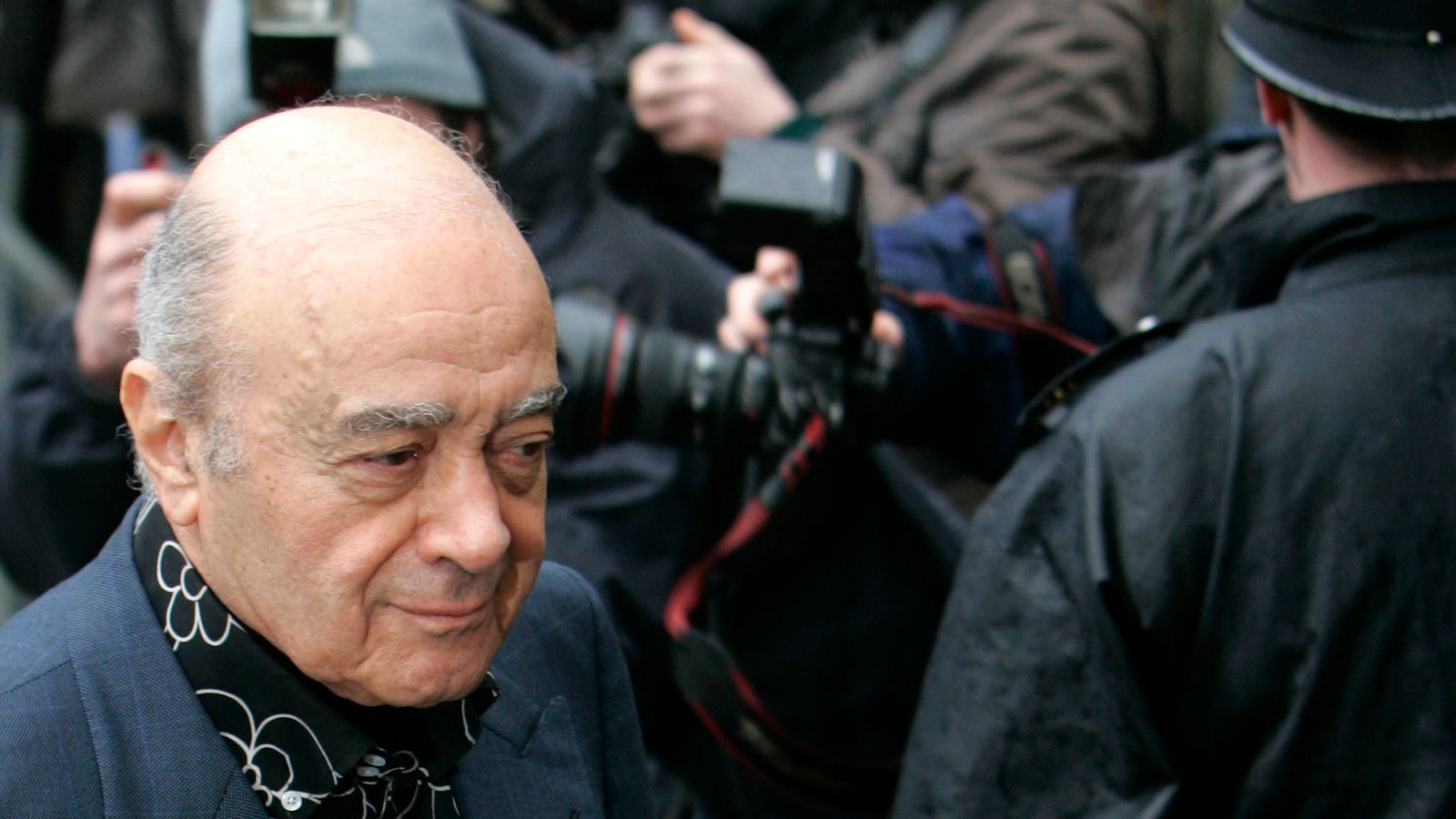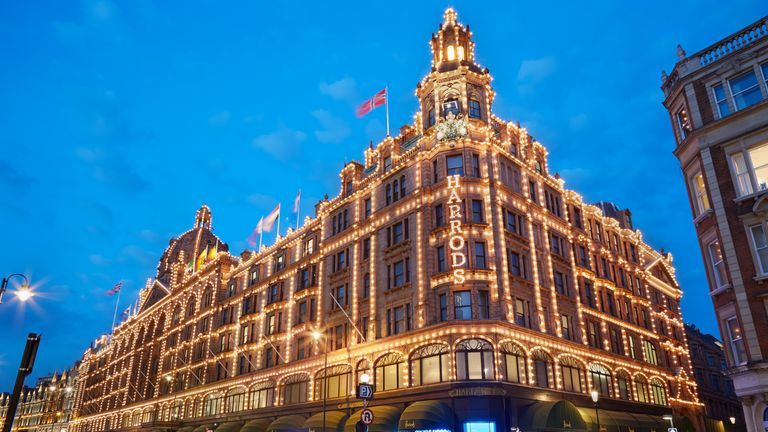Little has been heard from Mohamed Fayed during the last decade.
He sold Harrods to Qatar Holdings as long ago as May 2010 and his other main trophy asset in the UK, Fulham FC, was offloaded to the US businessman Shahid Khan in July 2013.
That latter deal brought down the curtain on a controversial – to say the least – career during which he had been a prominent figure in British business for nearly 30 years.
Read more:
Fayed’s death announced aged 94
Fayed (he added the honorific ‘al’ to his name, despite having no right to, after he arrived in the UK in the 1960s) remains best known to the general public for the relationship his late son, Dodi, enjoyed with Diana, Princess of Wales and for the corrupt payments he made to MPs to ask questions on his behalf in parliament.
Before that, though, the Egyptian tycoon had become a notorious figure in the City and in British business circles for his unorthodox approach and his somewhat casual relationship with the truth.
Many people, including some who should have known better, bought the story that this son of a primary school teacher was, in fact, the expensively educated scion of one of Egypt’s richest shipping families – although he did, in the end, accumulate a fortune the size of which was never entirely clear.
Founding his fortune
That fortune was founded on his early dealings with Adnan Khashoggi, a wealthy Saudi arms dealer, whose sister he married and later divorced.
After working for Khashoggi, his ability as a deal-maker drew him to the attention of the Sultan of Brunei, for whom he worked for a while and under whom he accumulated sufficient wealth to acquire a shipping agency.
He later sought to establish an oil production business in Haiti, posing as a Kuwaiti sheikh, before the samples he had hoped might be crude oil turned out to be molasses.
He eventually had to flee the island after falling out with its monstrous dictator ‘Papa Doc’ Duvalier.
After acting as a middleman in more deals in the Middle East, Fayed pitched up in London, again posing as an Arab sheikh and setting himself up in an apartment on Park Lane.
Many were taken in by him. He and his brother, Ali, had sufficient funds or backing by 1978 to buy the Ritz hotel in Paris for $30m.
The nastiest and dirtiest takeover battles in history
What really put him on the map though, so far as the City was concerned, was the saga which began in November 1984 and which turned into one of the nastiest and dirtiest takeover battles in history.
The mining conglomerate Lonrho, which owned a sprawling portfolio of assets across the world but primarily in Africa, had for years been trying to buy Harrods – then owned by the House of Fraser department store chain.
Its chief executive, Roland “Tiny” Rowland, had built a 29.9% stake in House of Fraser as a prelude to a takeover bid for the company – which was referred to the old Monopolies & Mergers Commission by Margaret Thatcher’s government.
Mr Rowland, who had been famously dubbed “the unacceptable face of capitalism” by the former prime minister Edward Heath, knew the referral could be tricky.
So he hit on the wheeze of “parking” the stake with the Fayed brothers.
Unfortunately for him, he was double-crossed by Mohamed who, backed by the Sultan of Brunei, used the stake to launch a £615m takeover bid of his own.
He acquired the business and, in the process, deprived Mr Rowland of a treasured asset he had been stalking for the best part of a decade.
An enraged Mr Rowland waged a campaign against him thereafter to obtain revenge on the ‘”phoney pharaoh”.
The Department of Trade & Industry investigated the takeover and, when Mr Rowland obtained a leaked copy of its report, he published it in March 1989 in a special midweek edition of The Observer, the world’s oldest Sunday newspaper, which was at the time owned by Lonrho.
The DTI report pulled no punches.
A ruined reputation
In their most damning line, the DTI inspectors said the Fayeds had “dishonestly misrepresented their origins, their wealth, their business interests and their resources to the secretary of state, the Office of Fair Trading, the press, the House of Fraser board, House of Fraser shareholders and their own advisers”.
It forever ruined Fayed’s reputation and, arguably, ensured that he was never given the British passport he craved for so many years.
Two years later, in an unprecedented move, the Bank of England forced the Fayed brothers to relinquish control of Harrods Bank after deciding they were not fit and proper people to run a deposit-taking institution.
However, despite Mr Rowland’s best efforts, Mr Fayed retained control of Harrods.
He gave up his fight in 1993 when, just before Christmas, he and Fayed publicly embraced in the Harrods food hall.
Months later, Mr Fayed floated House of Fraser on the stock market, but kept Harrods.
Troubled time at Harrods
The first two decades of his ownership of the department store were troubled.
Profits fell and Fayed was variously accused of electronically eavesdropping on employees and of firing minority employees with no cause.
Mr Rowland also alleged that papers he had kept in a security box at Harrods had been stolen and, while the police never charged anyone, damages were ultimately paid to Mr Rowland’s widow.
By the turn of the century, the business was in a bad way, with Mr Fayed’s management style ensuring a vast turnover of top management.
Between 2000 and 2002, Harrods lost no fewer than 12 directors, while between 2000 and 2005 it got through five managing directors.
Meanwhile the store itself, in the eyes of critics, degenerated into a “vulgar Egyptian theme park”.
Fayed finally got it right when, in March 2006, he poached Michael Ward, a retailer-turned-private equity executive, from Apax to fill the vacant post of Harrods managing director.
It was a fine and shrewd appointment.
During his first year in charge, Mr Ward increased annual profits at the business by 152% and, crucially, found a way of working with the owner.
Shortly after the Qatari takeover, in 2010, Mr Ward – who stayed with Harrods under its Qatari owners and propelled it to record annual sales and profits several times since – explained to the Sunday Times: “Once trust was established he was a very good person to work with. The problem, historically, was that nobody managed to cross that barrier.”
Interestingly, while Fayed sold both Harrods and Fulham, he never relinquished control of the Paris Ritz, the trophy asset he held on to longer than any other despite the fact that, for long periods of his ownership, it was heavily loss-making.
It will be interesting to see whether his heirs choose to cash in on this most valuable of properties after his death.

